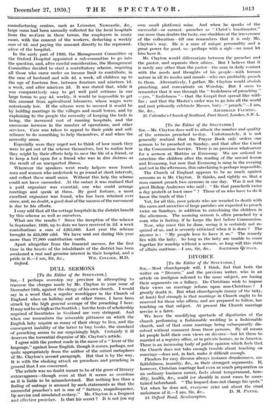DIVORCE
[To the Editor of the SrEerxron.1
Sni,—Most ehurchpeople will, I think, feel that both the writer on " Divorce," and the previous writer, who in an article on irreligion referred to the same subject, are basing their arguments on a fallacy. Do Christians wish to impose their views on marriage reform upon non-Christians I greatly doubt it. But what churchpeople (many of the laity, at least) feel strongly is that marriage in Church ought to be reserved for those who affirm, and arc prepared to follow, her teaching on that subject. At present the Church marriage service is a farce.
We have the unedifying spectacle of dignitaries of the church performing a fashionable wedding in a fashionable church, and of that same marriage being subsequently dis- solved without comment from those persons. By all means let people hold their own views on divorce—but let them be married at a registry office, or in private houses, as in America. There is an increasing body of public opinion which feels that the Church does not take enough trouble about teaching on marriage—does not, in fact, make it difficult enough.
Pleaders for easy divorce always instance drunkenness, un- faithfulness, insanity, &c., as their strongest arguments. 11 however, Christian marriage had even as much preparation as an ordinary business career, facts about temperament, here- dity, health, &c., could (or should) in most awes be ascer- tained beforehand. " The leopard does not change his spots." Yet when he does not, everyone cries out about the cruel unfairness of it.—I am, Sir, &c., D. M. PAYNE. 24 Oxford Road, Southampton.


































 Previous page
Previous page